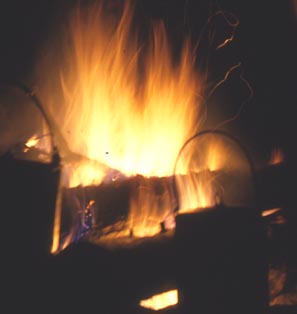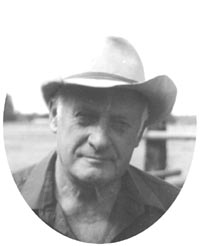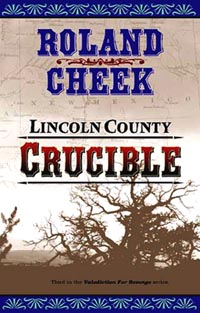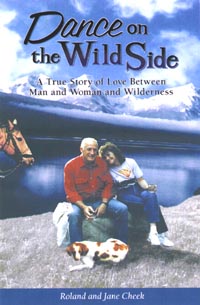a weblog sharing info on outdoor skills and campfire musing by a guy who spends a bunch of time in pursuit of both
CULTURE
WHERE -
TALES ARE TOLD OF
Welcome to Roland Cheek's Weblog
Roland is a gifted writer with a knack for clarifying reality. Looking forward to more of his wisdom
- Carl Hanner e-mail
There can be no living together without understanding, and understanding means compromise. Compromise is not a dirty word, it is the cornerstone of cvilization, just as politics is the art of making civilization work. men do not and cannot and hopefully will never think alike, hence each must yield a little to avoid war, to avoid bickering. men and women meet together and adjust their differences; this is compromise. He who stands unyielding upon a principle is often a fool, and often bigoted, and usually left standing alone with his principle while other men adjust their differences and go on. * Louis L'Amour in Bendigo Shafter / (Pretty sharp, those Western writers.)
To access Roland's weblog and column archives
Tip o' the Day
Cooking baked potatoes in the campfire is easier if you prebake them about three-quarters done at home. Wrap in foil, then finish in campfire coals. The upside is that it won't take as long.
Take along some big plastic bags for camp garbage. Even if you use burlap oat sacks, the plastic bags will keep the throw-aways from oozing.
A good hot weather tip is to cover your ice chest with a sleeping bar or two during the day. No, no -- it's not to keep the chest warm, but to keep it cool -- provided you cover it early in the day, while ambient air temperature is still cool. And keep the chest in the shade.
Jane repackages from jars to plastic as much as possible, or purchases foods already packaged in plastic. There are plastic canisters for peanut butter and squeeze bottles of good-tasting jams and jellies.
She packages individual salads in Seal-A-Meal bags: three-bean, pasta, marinated corn.
And she pre-cooks roasts, hams, and sometimes chicken, packages the meat in zip-lock bags and freezes it to ward off spoilage. All the above saves an unbelievable amount of weight for a float trip, or horseback packtrip.
Years ago we did it differently -- lots of jars and cans and fresh meat, whole potatoes, and store-bought pastries and cookies. Then she tried repackaging from jars and found she could eliminate 35 pounds of glass from one of our eight-person, ten-day hunting trips. By precooking much of the meats, she cut one-quarter of that weight and by packaging in zip-lock and freezing, there was no apparent loss in flavor.
While we were still guiding professionally, Jane baked all our wilderness trip cookies at home -- 320 dozen (3,840) homemade cookies for one season alone! All were baked and packaged for each individual trip, then stored in our freezer for timely use.
Desserts were tasty stir-and-serve pie fillings poured into already prepared cut-and-serve crusts. Or it was a stir-and-bake cake cooked in a Dutch oven.
In those days Jane's efficiency was readily apparent when she put together a hot, tasty, full-course meal ready for a troop of hungry guests, guides and their outfitter only an hour after pulling into some secluded and undeveloped campsite.
Echoes of Vengeance -- A military outpost situated in an isolated region of the Department of the Upper Missouri. An embittered Commandant who believes unkind fate kept him from fame and glory during the recent War of Seccession. A band of starving Blackfeet too riddled with smallpox to withdraw to their reservation. A young mixed-blood army interpreter whose aging parents are with the Blackfeet tries to prevent a massacre-in-the-making; he's beaten and dragged to the guardhouse for the attempt.
Thus the stage is set and principal characters in place for the opening pages of Echoes of Vengeance * Mule Milk News /Official Newsletter of the Montana Outfitters and Guides Association
SQUATTING IN AN ANTHILL, INSTEAD OF ON A HORSE
The day was like many others of mid-summer, hot and sultry. Cumulous clouds gathered over the peaks to the south and west, their flatiron botoms and cauliflower tops presaging heavy weather in the offing.
My buddy and I redoubled our speed. As we neared the end of a brutal day, increasing our speed meant moving up from a crawl to a stagger, then to a shuffle. Then the ribbon of trail we followed pitched sharply upward. I ran thumbs under the shoulder straps, shifting the heavy backpack load from their collarbone sore spots and bent to follow my friend in plodding step after plodding step.
For the thousandth time, we collapsed alongside the trail. "How much farther is it, for God's sake?" my buddy croaked, jerking off his cap to use as a fan.
"Can't be too far left," I gasped, mopping sweat from my face with a handkerchief, then waved it ineffectually at clouds of mosquitoes and horseflies moving in for the kill.
Then we heard 'em--a packstring on the move, though at the time we didn't know what we were hearing; didn't know the difference between the sounds of horse hoofs on a trail from a Broadway motorcade. After all, this was our first great wilderness adventure. The packer and his saddlehorse hove into view, followed by a half-dozen mules.
His horse spotted us and shied. The man kept his seat as though glued there, snatching up the reins and cursing at his steed. Then he also saw us propped against trailside jackpines and brought his string alongside, reining them to a halt.
The man looking glumly down at us couldn't have been tall, but he made up for it in girth. His was a six-day salt-and-pepper beard, and when he pulled off his Walter Brennan-style ten-gallon hat to wipe sweat from the band, he was as bald as a billiard ball. To add to the effect, his trousers were held up by wide, button-flap suspenders and his open-throat shirt was of worn ginghams. The boots were a disappointment--clodhopper-style. One heel hung loose.
The man continued to stare down down his nose, measuring us as we stared up, somewhat fearful of him. Looking back on it, what he saw could not have been reassuring: two wet-behind-the-ears youths sprawled at his feet, obviously at the end of their tether. We still fitted arms into huge packs, no doubt overloaded with unnecessaries. Our shirtfronts were soaked and salt-encrusted. Off to one side, the glob I'd puked before throwing myself to the ground, had yet to soak through fir and pine needles. Finally a hole opened where his mouth should be and the man said, "Most folks I know would've picked a better place to sit."
I rolled over and looked where he pointed, seeing the ant hill for the first time. I rolled from my pack with alacrity and brushed off scurrying ants that still looked for a place to bite that would get my attention. My partner, Ted, crabbed sideways, shuffling his heavy pack until it propped against a tree.
Still, the horseman regarded us. At last he jammed his hat back on his head and focusing on me, said, "Son, there's way too many horses in this world for a man to have to walk." Then he clucked to his string and plodded off into the sunset.
That old U.S. Forest Service packer had an enormous impact during the ten minutes he studied us and the 30-seconds he talked to us. Though he and his kind soon became postscripts in the history of the Oregon Cascades, I never forgot both the lessons and the examples he passed along that day:
1. Make time to be pleasant to strangers.
2. Be certain where you choose the pause and sprawl is really where you want to be.
3. There might be advantages to horseback travel over foot slogging.
Ted and I staggered on up the trail that day, to the Forest Service trail shelter we targeted. That day was followed by several pleasant days spent in a remote valley, far from civilization. But that old mule packer stuck in my memory. And when I arrived in Montana many years later, I never let my shirttail touch my back until I had horses to ride into some of the vast wilderness areas scattered throughout those Northern Rockies that became my home.
Roland Cheek wrote a syndicated outdoors column (Wild Trails and Tall Tales) for 21 years. The column was carried in 17 daily and weekly newspapers in two states. In addition, he scripted and broadcast a daily radio show (Trails to Outdoor Adventure) that aired on 75 stations from the Atlantic seaboard to the Pacific Ocean. He's also written upwards of 200 magazine articles and 12 fiction and nonfiction books. For more on Roland, visit:
www.rolandcheek.com
Recent Weblogs
Tuesday, February 26, 2008
There's a bunch of specific info about Roland's books, columns, archives and radio programs. By clicking on the button to the left, one can see Roland's synopsis of each book, read reviews, and even access the first chapter of each of his titles. With Roland's books, there's no reason to buy a "pig in a poke."
for detailed info about each of Roland's books
Read Reviews
Read their first chapters
For interested educators, this weblog is especially applicable for use in history, economic, and government classes, as well as for journalism students.
Roland, of course, visits schools. For more information on his program alternatives, go to:
NEXT WEEK:
PERILS OF SPRING BREAK UP
www.campfireculture.com
Roundup Magazine says of The Silver Yoke, the final book in the acclaimed Valediction For Revenge series: This novel has lots of action, a terrific villain you love to hate, the smell of dust and dynamite, and a man sworn to bleed his enemies, not of blood but of money, the only they love.
This is another page turner from Cheek with characters that possess all three dimensions and are tough to kill. Any readers who likes action, adventure, and a plot with more twists than a sidewinder will love Gunnar's Mine * Roundup Magazine
Lincoln County, New Mexico, where poor farmers and ranchers are at the mercy of crooked merchants, the military, and a corrupt territorial government run by something called the "Sante Fe Ring," But who are the "good" guys? Billy the Kid? John Chisum?
Book three in the Valediction For Revenge series, the completion of Jethro Spring's adventures in New Mexico
Crisis On the Stinkingwater is Cheek's darkest book. It is also the most realistic. The portrayal of the depth of hatred engendered by the bitter conflict between rancher and homesteader chills the reader * Roundup Magazine
Two books -- one about the people, the second about their place of adventures
For detailed information about Roland's books
source links for additional info
to visit Roland's newspaper columns and weblog archives
to send this weblog to a friend
to tell Roland what you think of his Campfire Culture weblog










